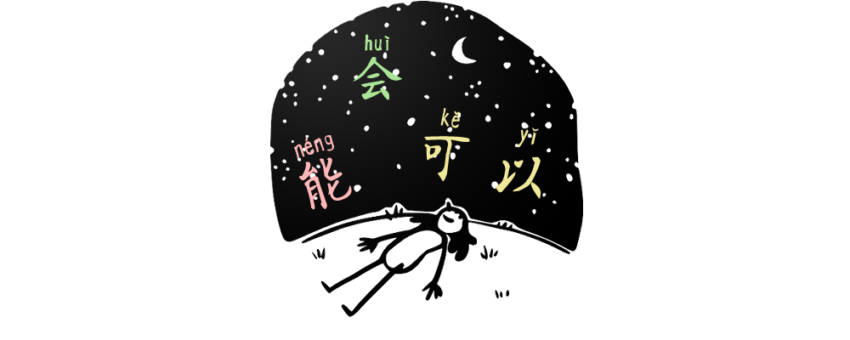The three verbs 能 néng, 会 huì, and 可以 kěyǐ can all be translated as “can” in English. However, each of these terms has a unique meaning, and they are not always interchangeable. At times, their meanings do overlap, but not always.
能 néng
能 néng emphasizes one’s natural ability, as opposed to learned ability. It refers to the ability to do something without the need for training or education, and can also be used to describe changes in one’s ability over time. It is similar in meaning to “to be able to do something.”
我能說話我能说话
I can talk.
我能一次喝下10罐啤酒我能一次喝下10罐啤酒
I can drink 10 cans of beer at one time.
FYI
Did you know that Taiwanese people are known as the “worst drinkers” in the world? It’s not because we don’t like to have fun, but around half of us have a genetic condition that makes it difficult for our bodies to process alcohol properly. This means that we experience symptoms of alcohol intolerance such as facial flushing, rapid heartbeat, headaches, dizziness, nausea, and even hangovers more easily than others. So, if you’re looking to make friends with Taiwanese people, you might want to consider doing something other than drinking to bond with us.
他不能吃辣他不能吃辣
He can’t eat spicy food.
我不能說中文我不能说中文 (X)
I can’t speak Chinese.
(In this case, we don’t use 能 néng because the reason why you cannot speak Chinese is that you haven’t learned it, rather than any physiological problem that prevents you from speaking.)
会 huì
会 huì emphasizes a skill that you have learned or been trained to do. It refers to the ability to do something that has been acquired through training or education, and is often used to describe skills, such as speaking a language or playing a musical instrument. It is more like “knowing how to do something.“
我會開車我会开车
I can drive
(I know how to drive.)
我不會說中文我不会说中文
I can’t (don’t) speak Chinese.
(Because I didn’t learn it.)
我不會打籃球我不会打篮球
I don’t know how to play basketball.
可以 kěyǐ
可以 kěyǐ refers to permission or the ability to do something in a given situation. It is often used to make requests or ask for permission, and can also be used to describe what is allowed or permissible in a particular context.It is similar in meaning to the English phrases “may I” or “could you” in an interrogative sentence (question sentence).
我可以說英文嗎?我可以说英文吗?
May I speak English?
不可以拍照不可以拍照
No photos allowed.
請問可以借我手機嗎?请问可以借我手机吗?
May I borrow your cell phone?
Intermediate Level
THE OVERLAPPING PART
能 néng and 可以 kěyǐ
Both 能 néng and 可以 kěyǐ can be used to express possibility:
你今天能/可以來我家嗎?你今天能/可以来我家吗?
Can you come to my place today?
(Is it possible for you to come to my place today?)
你能/可以把鹽遞給我嗎?你能/可以把盐递给我吗?
Can you pass the salt to me?
你能/可以說慢一點嗎?你能/可以说慢一点吗?
Can you say it a little slower?
你能/可以閉嘴嗎?你能/可以闭嘴吗?
Could you shut up?
However, when you want to express impossibility in Chinese, 不能 bùnéng is the only choice.
我今天很忙,不能去你家我今天很忙,不能去你家
I am quite busy today, so I can’t go to your place.
(No possible)
我今天很忙,不可以去你家我今天很忙,不可以去你家 (X)
I am quite busy today, so I can’t go to your place.
(If you use 不可以, it implies someone not allowed you to go.)
我媽說太晚了,今天不可以去你家我妈说太晚了,今天不可以去你家
My mom said it’s too late, so I can’t go to your place today.
(You are not allowed to)
Both 能 néng and 可以 kěyǐ can be used to express restore ability:
經過手術後,我又能/可以走路了经过手术后,我又能/可以走路了
After the surgery, I could walk again!
能 néng and 会 huì
Both 能 néng and 会 huì can be used to express “be good at something” in Chinese. When using these terms in this context, it is common to use an adverb before the verb to indicate the degree of proficiency. Similarly, using 能 néng emphasizes someone’s natural ability, while 会 refers to a learned skill.
我非常能/會吃辣我非常能/会吃辣
I can eat very spicy.
他很能/會喝酒他很能/会喝酒
He is really good at drinking!


